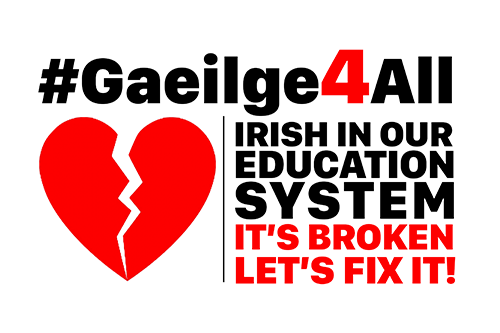- According to a survey from Kantar Millward Brown in 2019, 60% of young people (aged 15-24) are in favour of keeping Irish as a core leaving subject and only 19% were opposed to it.
- Any student who does not take Irish for the Leaving Certificate will lose many employment and career opportunities, not only in primary teaching but in other professions as well.
- It cannot be assumed that Irish will be available to all school students if it were optional in the schools. The provision of any subject depends on different conditions: demand from students, supply of teachers, rooms, etc.
- If Irish was an optional subject it would go into a pot where everything from Art to Home Economics to Music to Chemistry would also be included. Remember also that there are more subjects been added to the pot all the time – for example, physical education, politics and computer science, etc.
- If this system comes in, at least in some cases, students with special needs would not be allowed / not have the opportunity to study Irish.
- Each level in the school is interdependent – if Irish is optional for the Leaving Certificate there will be less emphasis on Irish in the Junior Certificate or even in primary school.
- When modern foreign language learning was made optional place in England at GCSE, the number of people studying languages fell from 79% in 2001 in the age group to 41% in 2018. This number would much lower still but some private schools kept foreign language learning compulsory
- Irish second-level teachers would gradually lose jobs.
- It would end many summer colleges in the Gaeltacht, which would cause huge damage to those Gaeltacht areas.
- PEIG was removed from the Leaving Cert 20 years ago.
Why would students not choose Irish if Irish was optional for the Leaving Certificate?
- There would be pressure on pupils, due to the points system, to choose the subjects identified as ‘easy’ subjects and Irish (and other languages) could suffer.
- Irish would compete with other subjects required for third level (e.g., biology is needed for medicine)
- The public discourse connects Irish & stress. Neither parents nor students will want to put that ‘stress’ on themselves.
- Irish will no longer be available in all schools.
- There would be a discouragement from Primary school for Irish.
Apt Quote:
“We could make it optional for Leaving Certificate; and after a few years we might come to think that it should be optional for Junior Certificate too; and after that – well, what’s the point of bothering with compulsory Irish at primary level, if it’s going to be taken only by a tiny minority at second level? If we follow this path, we may well find that by the end of this decade Ireland has sold its linguistic birthright and staked its entire future – cultural, political, economic – on the continuing international dominance of English. On the other hand, we can respond by taking seriously the linguistic challenge of the European project; recognizing that Irish belongs not just to Ireland’s but to Europe’s linguistic heritage; taking note of the empirical fact that the more languages you learn, the easier it becomes; insisting that Ireland’s membership of Europe requires us to make foreign language learning a compulsory part of schooling; and seeking ways of achieving more effective learning outcomes. This kind of response requires political commitment and a coherent national effort leading to a language education policy capable of generating an integrated language curriculum that in turn can facilitate pedagogical reform.”
Professor David Little from The future of languages in Irish education: policy, curriculum, pedagogy
